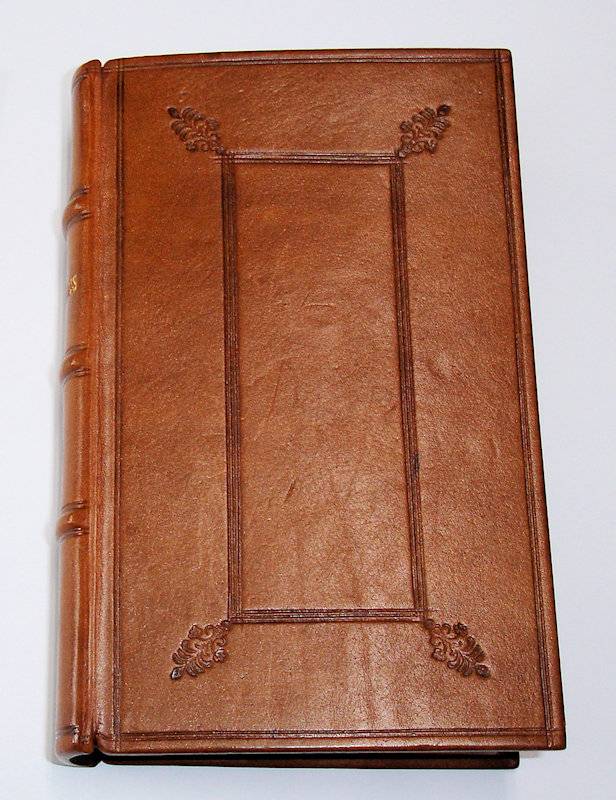LACTANTIUS.
Lucii Coelii Lactantii Firmiani Opera, quae extant omnia. Ad fidem codicum tam impressorum quam manu scriptorum recensita.
Cambridge (Cantabrigiae), Ex Officina Johan. Hayes, Celeberrimae Academiae typographi, 1685.
8vo. (LXXX),589,(27 index) p. Modern calf antique style, second half 20th century. 17 cm (
Ref: ESTC
R2417;
Brunet 3,736; Graesse 4,67; Ebert 11612) (
Details: Back with three raised bands. Gilt short title in second compartment. Boards with double fillet blind borders, within which is a triple fillet rectangle with corner pieces. The Cambridge University, 'Alma Mater Cantabrigia', woodcut printer's device on the title with the University's motto: 'Hinc lucem et pocula sacra', 'From this place, we gain enlightenment and precious knowledge'. Woodcut initials. The tasteful antique style binding was made by 'Period Binders, Bath, England') (
Condition: The boards are slightly curved. The title is thumbed and finger soiled. Old inscription on the somewhat soiled front flyleaf) (
Note: The Latin Christian author Lactantius was born ca. 250 A.D. in the Roman province Africa, and he died ca. 325 in Gaul. In the Renaissance Lactantius was sometimes called 'Cicero christianus', the christian Cicero. He went to Bithynia in Asia Minor to teach Latin rhetoric. There he was converted to christianity, and after the beginning of the Great Persecution (of the christians) which ravaged ca. 300, he became an eloquent apologist in defence of christianity. In old age he was tutor to Crispus, son of Constantine the Great, the first 'christian' emperor. His earliest surviving work is 'De opificio Dei' (On the craftmanship of God), in which 'he works out with some elaboration the thesis that the human body shows by its admirable structure the existence of a wise and benificient Creator'. (H.J. Rose, A handbook of Latin Literature, Ldn, 1967, p. 482) The 'Institutiones Divinae' (Divine Teachings) is his principal work, which probably occupied him for several years. It consists of 7 books. 'Book 1, 'de falsa religione' is directed against the pagan religion, book 2, 'de origine erroris', treats the machinations of the devil. In book 3, 'de falsa sapientia' Lactantius criticizes Greek and Roman philosophy, the 4th book, 'de vera sapientia et religione' elaborates on the superiority of the christian faith. Book 5, 'de iustitia' discusses justice brought back by Christ and persecuted by the pagans. Book 6, 'de vero cultu' explains the duties of a christian. In book 7, 'de vita beata' the aim of human existence is considered to be immortality and the nearness of God. The 'Institutiones Divinae' 'give a full and eloquent statement of what christian doctrine is, with the incidental result that we get a most interesting and very readable account of what an intelligent christian believed in an age so uncritical that the forged Sibylline oracles were accepted without hesitation as genuine documents'. (op. cit. p. 482) Another theological work, now on a small scale, 'de ira Dei', discusses the question in what sense Anger can be attributed to a perfect Being. Gods Anger is part of his power, and a necessary part of his Grace. 'De mortibus persecutorum' is a work of history about the persecution of christians and Gods revenge upon the deadliest of enemies of the Church.
§ The editor of this text is an anonymous. In the preface (page A2 recto) he tells that he used for this Cantabrigian edition of 1685 three printed works and 2 manuscripts. He consulted (1) a Basle edition of 1532, printed by Cratander & Bebel, (2) the Plantin edition of 1587 of the Spanish Roman catholic prelate Michael Thomasius, 1529-1578, bishop of Lérida, (3) and the edition of Leiden 1652 which was produced by the Dutch jurist and classical scholar Antony Thys, or in Latin Antonius Thysius, 1603-1665. The editor of this Cambridge edition collated also two manuscripts, the first one from the library of the University is dated 1465 and was produced in the Benedictine monastery of Subiaco, the second manuscript, dated 1424, was held by Emmanuel College, Cambridge, and was lent to him by one of its Fellows. (Preface page A2 verso) The editor further made use, passing over this use without comment, of a Lactantius edition of the English scholar Thomas Spark, which was published one year earlier (1684) in Oxford. He repeats Spark's extensive notes on 'De mortibus persecutorum'.
§ None of the descriptions of this book we found in bibliographies or libraries mentions the name of the editor. The most recent bibliography consulted, 'Bibliography of Lactantius', compiled by Jackson Bryce. Second revised version, August, 2007, also does not mention him. On the internet we found in the 'Oxford Historical Society Publications', 34, 1898, page 331, a note (the only one), that one Dr. Shorting was the editor. We followed this lead, and gathered the following biographical data: Matthew Shorting D.D. (Doctor of Divinity) was later in life, in 1705, headmaster of Merchant-Taylor's School in London, he died in 1707. In 1678 he was Fellow of Pembroke at Cambridge, and acted as a librarian of the University Library of Cambridge in 1685. He was a patrologist, and in 1683 he published in Cambridge an English translation of the church histories of Eusebius Pamphilus, Socrates Scholasticus and Evagrius Scholasticus, 'The history of the church: from our Lord's incarnation, to the twelfth year of the Emperour Mauricius Tiberius, or the Year of Christ 594'. This scholar, who was librarian in 1685, might have edited this Lactantius, having had the opportunity to collate the Lactantius manuscripts from the 'Celeberrimae Academiae nostrae Bibliotheca publica', (Preface p. A2 recto) and the 'Bibliotheca Collegii Emmanuelensis apud nos Cantabrigenses'. (Ibidem p. A2 verso)) (
Collation: A8, a-d8; B-Z8, Aa-Qq8, Rr4) (Photographs on request)
Book number: 120437 Euro 450.00
Keywords: (Oude Druk), (Rare Books), Lactantius, Latin literature, Spätantike, antike altertum antiquity, early christian literature, early christianity, frühchristliche Literatur, frühes Christentum, late antiquity, römische Literatur
 LACTANTIUS.
LACTANTIUS.